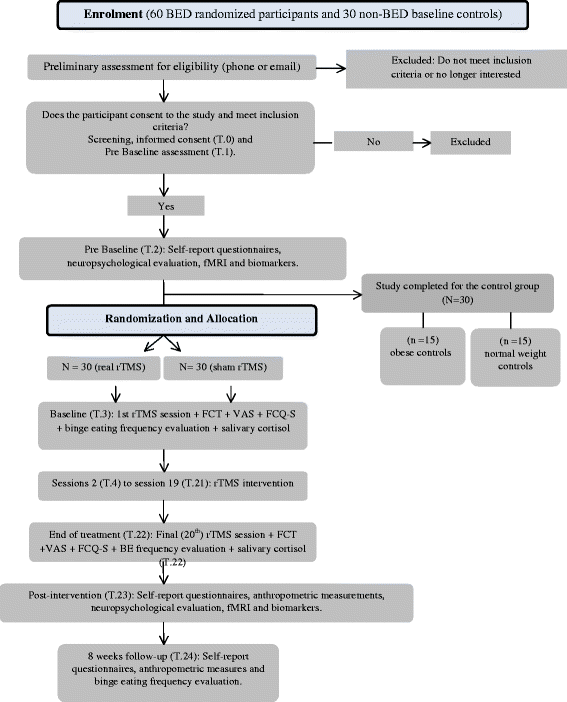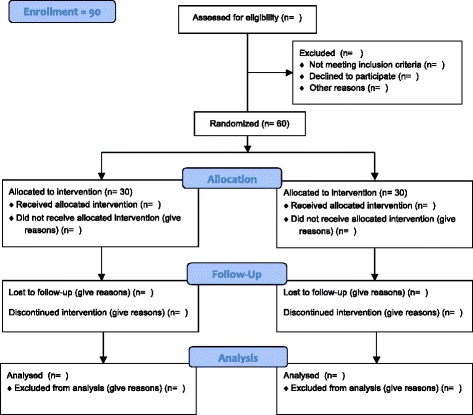The effects of repetitive transcranial magnetic stimulation in obese females with binge eating disorder: a protocol for a double-blinded, randomized, sham-controlled trial
- PMID: 26265452
- PMCID: PMC4533762
- DOI: 10.1186/s12888-015-0569-8
The effects of repetitive transcranial magnetic stimulation in obese females with binge eating disorder: a protocol for a double-blinded, randomized, sham-controlled trial
Abstract
Background: Binge eating disorder is a new category in DSM-5 and highly associated with higher body mass index. The neural mechanisms that underlie binge eating are of great interest in order to improve treatment interventions. Brain mechanisms underlying drug and food craving are suggested to be similar: for example, both are reported to be associated with increased neural activity in the orbitofrontal and anterior cingulate cortex, and a diminished regulatory influence from lateral prefrontal circuits. Several studies have begun to assess the potential benefits of brain stimulation in reducing craving and addictive behaviors. Data from a study of a one-off session of transcranial magnetic stimulation in healthy women identified as strong cravers and of individuals with bulimic-type eating disorders, reported a reduction in food craving and binge eating episodes. This provides support for a more extensive investigation of the potential therapeutic benefits of transcranial magnetic stimulation. Lastly, brain imaging studies and a dimensional approach, will improve understanding of the neural correlates of the disorders and of the mode of action of transcranial magnetic stimulation.
Methods/design: Sixty eligible obese females, with binge eating disorder, will be randomly allocated to receive 20 sessions of transcranial magnetic stimulation intervention (n = 30) or the sham transcranial magnetic stimulation intervention (n = 30) scattered 3 days/week. Thirty eligible controls will complete the baseline assessment. The primary outcome (number of binge eating episodes) will be assed at each treatment sessions, and 8 weeks after intervention completion (follow-up). It is hypothesized that mean weekly binge-eating episodes will be reduced in the intervention group, compared to the sham group, and that the effect will be maintained at follow-up.
Discussion: Despite the severity associated with Binge Eating Disorder, there are limited treatment options. This study is an important step in the development of more effective treatments. Importantly, the study is the first to investigating binge eating disorder using a dimensional approach, by looking at the different aspects of the disorder, such as behavioral factors, biological factors, brain circuits and chemistry.
Trial registration: Clinical Trials NCT02180984 . Registered in July 2014.
Figures
Similar articles
-
Combining cognitive bias modification training (CBM) and transcranial direct current stimulation (tDCS) to treat binge eating disorder: study protocol of a randomised controlled feasibility trial.BMJ Open. 2019 Oct 22;9(10):e030023. doi: 10.1136/bmjopen-2019-030023. BMJ Open. 2019. PMID: 31640997 Free PMC article. Clinical Trial.
-
Neuroimaging and neuromodulation approaches to study eating behavior and prevent and treat eating disorders and obesity.Neuroimage Clin. 2015 Mar 24;8:1-31. doi: 10.1016/j.nicl.2015.03.016. eCollection 2015. Neuroimage Clin. 2015. PMID: 26110109 Free PMC article. Review.
-
Repetitive transcranial magnetic stimulation reduces cue-induced food craving in bulimic disorders.Biol Psychiatry. 2010 Apr 15;67(8):793-5. doi: 10.1016/j.biopsych.2009.11.023. Epub 2010 Jan 8. Biol Psychiatry. 2010. PMID: 20060105 Clinical Trial.
-
Effects of transcranial direct current stimulation (tDCS) on binge eating disorder.Int J Eat Disord. 2016 Oct;49(10):930-936. doi: 10.1002/eat.22554. Epub 2016 May 9. Int J Eat Disord. 2016. PMID: 27159906
-
The Effectiveness of Transcranial Direct Current Stimulation (tDCS) in Binge Eating Disorder (BED)-Review and Insight into the Mechanisms of Action.Nutrients. 2024 May 17;16(10):1521. doi: 10.3390/nu16101521. Nutrients. 2024. PMID: 38794759 Free PMC article. Review.
Cited by
-
The Relationship between Overweight/Obesity and Executive Control in College Students: The Mediating Effect of BDNF and 5-HT.Life (Basel). 2021 Apr 3;11(4):313. doi: 10.3390/life11040313. Life (Basel). 2021. PMID: 33916706 Free PMC article.
-
High frequency deep transcranial magnetic stimulation acutely increases β-endorphins in obese humans.Endocrine. 2019 Apr;64(1):67-74. doi: 10.1007/s12020-018-1791-1. Epub 2018 Nov 8. Endocrine. 2019. PMID: 30406883 Clinical Trial.
-
Brain Stimulation in Eating Disorders: State of the Art and Future Perspectives.J Clin Med. 2020 Jul 23;9(8):2358. doi: 10.3390/jcm9082358. J Clin Med. 2020. PMID: 32717984 Free PMC article. Review.
-
Ameliorating cognitive control in patients with binge eating disorder by electrical brain stimulation: study protocol of the randomized controlled ACCElect pilot trial.J Eat Disord. 2022 Feb 19;10(1):26. doi: 10.1186/s40337-022-00544-7. J Eat Disord. 2022. PMID: 35183261 Free PMC article.
-
Repetitive transcranial magnetic stimulation of the left dorsolateral prefrontal cortex in binge eating disorder: a double-blind randomized controlled trial.Psychol Med. 2025 May 16;55:e149. doi: 10.1017/S0033291725000492. Psychol Med. 2025. PMID: 40376936 Free PMC article. Clinical Trial.
References
-
- American Psychological Association . Diagnostic and statistical manual of mental disorders. 5. Arlington, VA: American Psychiatric Publishing; 2013.
-
- American Psychiatric Association . Diagnostic and statistical manual of mental disorders. 4. Washington, DC: American Psychiatric Association; 2000.
Publication types
MeSH terms
Substances
Associated data
LinkOut - more resources
Full Text Sources
Other Literature Sources
Medical



